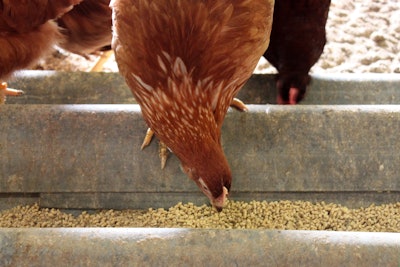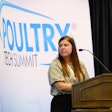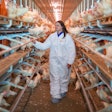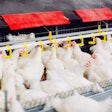
Yiannis Kaznessis, the founder and CEO of General Probiotics and AgThera, presents the development and testing of a recombinant antimicrobial live therapeutic for performance improvements and for prevention and control of necrotic enteritis (NE) associated with Clostridia perfringens in broiler chickens. In the U.S., a recombinant live therapeutic is considered an animal drug. In this presentation, which is part of the 2023 Poultry Tech Summit, Kaznessis discusses how FDA-authorized field trials are demonstrating a strong, dual value proposition for chicken producers: a six-point average feed conversion ratio and a significant decrease in mortality due to NE.
Hello, I'm Yiannis Kaznessis, the chief executive officer at General Probiotics and its DBA, AgThera. At AgThera, we develop recombinant antimicrobial life therapeutics that help farmers raise healthy chickens and produce animal protein that is clean, affordable and sustainable. At AgThera, we bring science to one health.
There are 8 billion of us these days on this planet, and we all need a secure supply of safe food. Animal protein is of paramount importance in the diets of everybody. The farming industry, in its efforts to produce the animal protein we all demand and deserve, faces these days unprecedented struggles, including pandemics, war, climate change, and the overuse of antibiotics. AgThera stands next to farmers, aiding innovative advanced probiotics, innovative antimicrobial recombinant life therapeutics that kill pathogens, resulting in healthy animals and a clean, affordable, sustainable food source for families, worldwide. Our goal, ultimately, is to replace all antibiotics in livestock production.
A few key highlights about AgThera: we recently, in the last few months, have tested our product in commercial farm environments with what chicken producers and chief veterinarians of chicken producers called staggering results. We have been awarded $5 million in grant funding from the Department of Defense, the National Science Foundation, to the United States Department of Agriculture, all supporting the domestic manufacturing of advanced probiotics like ours. We have a unique regulatory path we're pursuing, working with the Center for Veterinary Medicine at the FDA. The agency has deemed our technology innovative and safe for both environment and human food. There are patents that protect our technology, and there is the trademark "Science to One Health." We have also been able to scale up manufacturing at a commercial readiness scale.
What is it that we do? We genetically engineer, with genetically modified probiotics, to express and secrete antimicrobial proteins, inside the gastrointestinal tract, the reservoir of major pathogens, like Clostridium perfringens, for example. We have, at the core of our technology, the delivery, the protein delivery side, the gastrointestinal track. Our main acid is a probiotic we have genetically modified to express and secrete enterocins, that very efficiently kill Clostridia inside the small intestinal tract of chickens.
Here are some of the results we have ben able to demonstrate in commercial environments recently. With using AgThera's products, helps birds grow with a six-point reduced feed conversion ratio, compared to birds that have not been administered our product. This is a staggering result, again, according to the broiler managers and the chief veterinarians of major chicken producers in the U.S. But we also see that when we use our product, there is anywhere between 50 to 67% less mortality because of necrotic enteritis whenever there is an outbreak. The numbers vary depending on the strain of the Clostridium perfringens that sickens the birds. Again, very impressive and consistent results in different management practices in environments with different management practices. There are are also significant ESG benefits using our product in the U.S.; just in chicken production, would result in the reduction of emissions by over 20 billion kilograms of C02.
Our products also replace conventional antibiotics, reducing the risk, the considerable risk, of antibiotic-resistant bacteria emerging, and improving human health, ultimately. Now you ask, How can we market a genetically engineered product in the United States? We have to have approval by the FDA. And the FDA's primary focus is on the safety of products that are being used in animal health. So we have worked with the agency over the last two and a half, three years now, demonstrating the safety of our products. The agency has granted us a categorical exclusion claim, meaning that they do not think that there is any extraordinary circumstances related to the environmental risk when using our products in commercial farm production. In order for us to get the categorical exclusion claim, we had to show that indeed no extraordinary circumstances exist for using our genetically modified E. coli-secreting enterocin A. GP1191 is the the internal name of our main acid, and we have shown the agency that it is a benign, non-pathogenic, non-virulent natural isolate without any extraordinary growth potential. We are also focused on enterocin A, which is a small protein generally harmless and degrades rapidly in any environment containing proteases.
Ultimately, we proved that less than 1% of the organisms administered to chickens are found cumulatively in the gut contents of birds, on the surface of birds, or in the floor litter in a farm environment. There was a steady decline of GP1191 over time, under all conditions tested, and we did demonstrate that the half-life of enterocin A ranges from a few hours in soil and litter samples to just a few seconds inside the GI tract of chickens.
Importantly, the agency has granted us a food use authorization, agreeing with our assessment that the risk to human food when we use the GP1191 in birds that are going to be consumed by by humans is low. To get the food use authorization, we had to prove that the use of our product is consistent with a public health. We were focusing on the least assessment, on the exposure assessment, on the consequences assessment, and the microbial resistance assessment. Looking at probabilities that the organism is going to be present in poultry, that the probability of humans ingesting our organism from food, or the probability that human exposure to GP1191 will have adverse health consequences, we found for each one of them there is the probability to be low with the overall risk of using GP1191 in human food to be low.
Now, one can ask why go into the trouble of engineering probiotics when there are naturally occurring ones that do have considerable antimicrobial activity. I like giving this analogy. If you want to cross a river, you can find natural ways of doing so. You can find natural resources, naturally occurring ways to make this happen. But if you want to do this consistently, at a large scale, with desirable effects, time again, you would be better off by designing, building and operating an actual bridge. This is a difference between engineered and naturally occurring probiotics in our minds.
This is a discovery platform that allows us to have assets, not just against Clostridium perfringens, the engineered organisms that express and secrete peptides against Salmonella, Enterococcus, E. coli, and more recently, peptides that elicit immune responses against Clostridial parasites.
So, join us to improve the health of humans, animals and the planet. Partner with us. We are already partnering with major names in the industry. And we're always looking for new partners to continue moving this unique technology through the FDA Center for Veterinary Medicine registration process. We're doing this for them as a potential and with an extra team that has the leadership that is necessary to advance this type of technology into the U.S. market. Thank you.


















